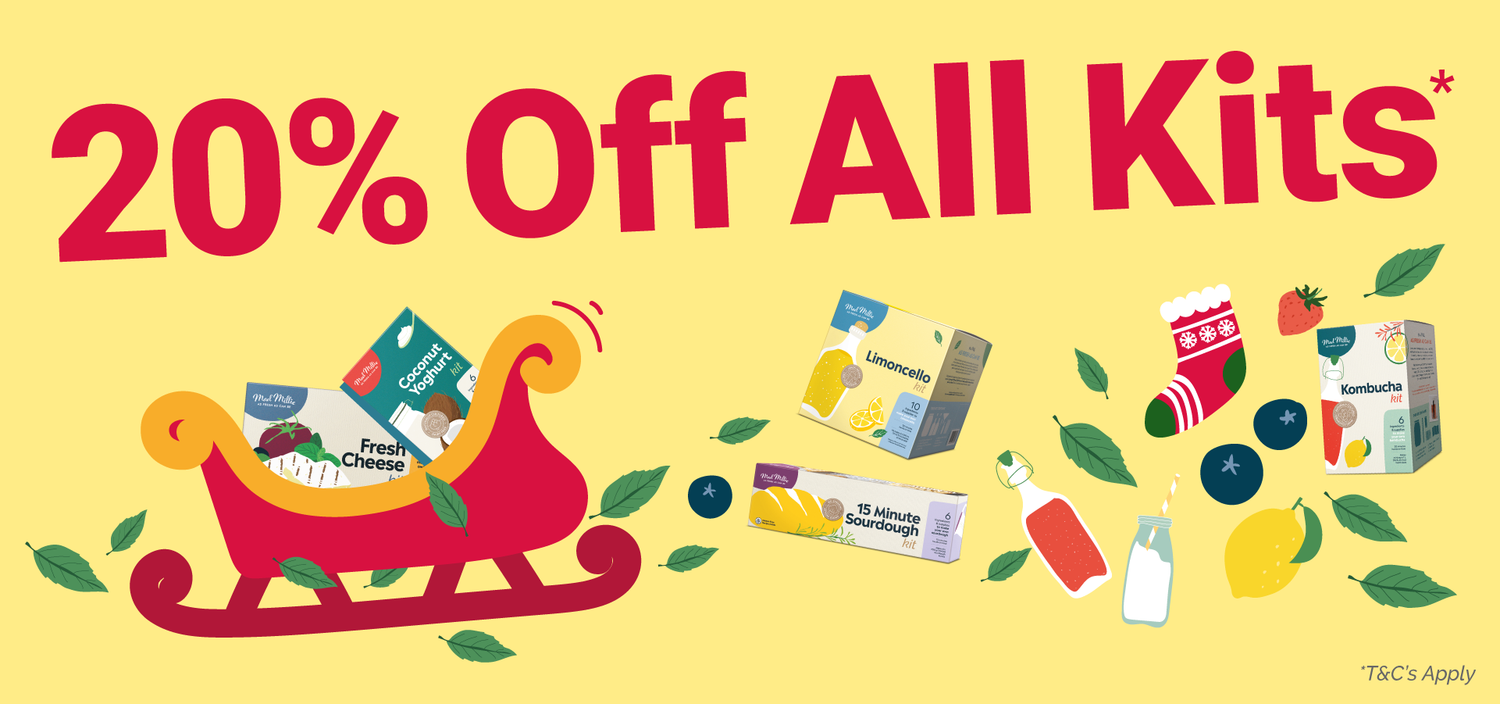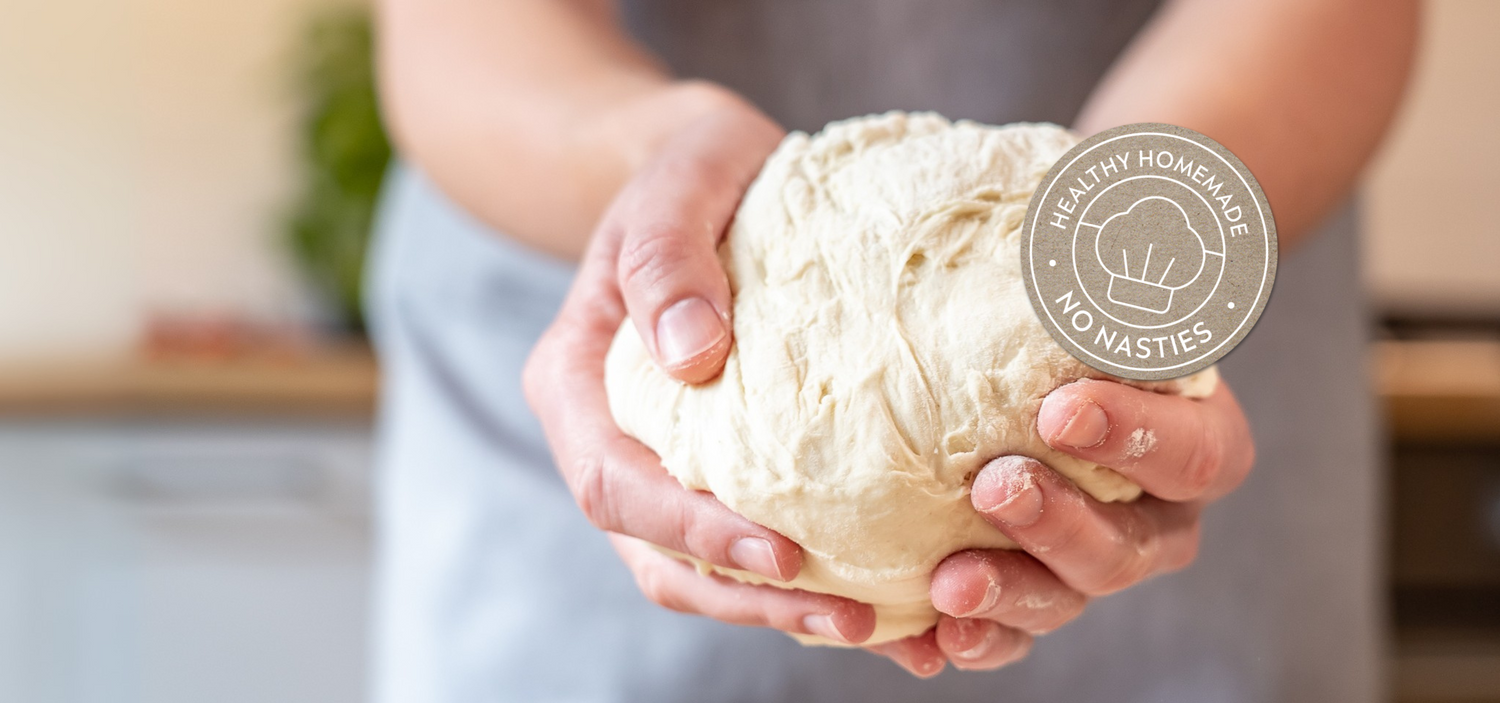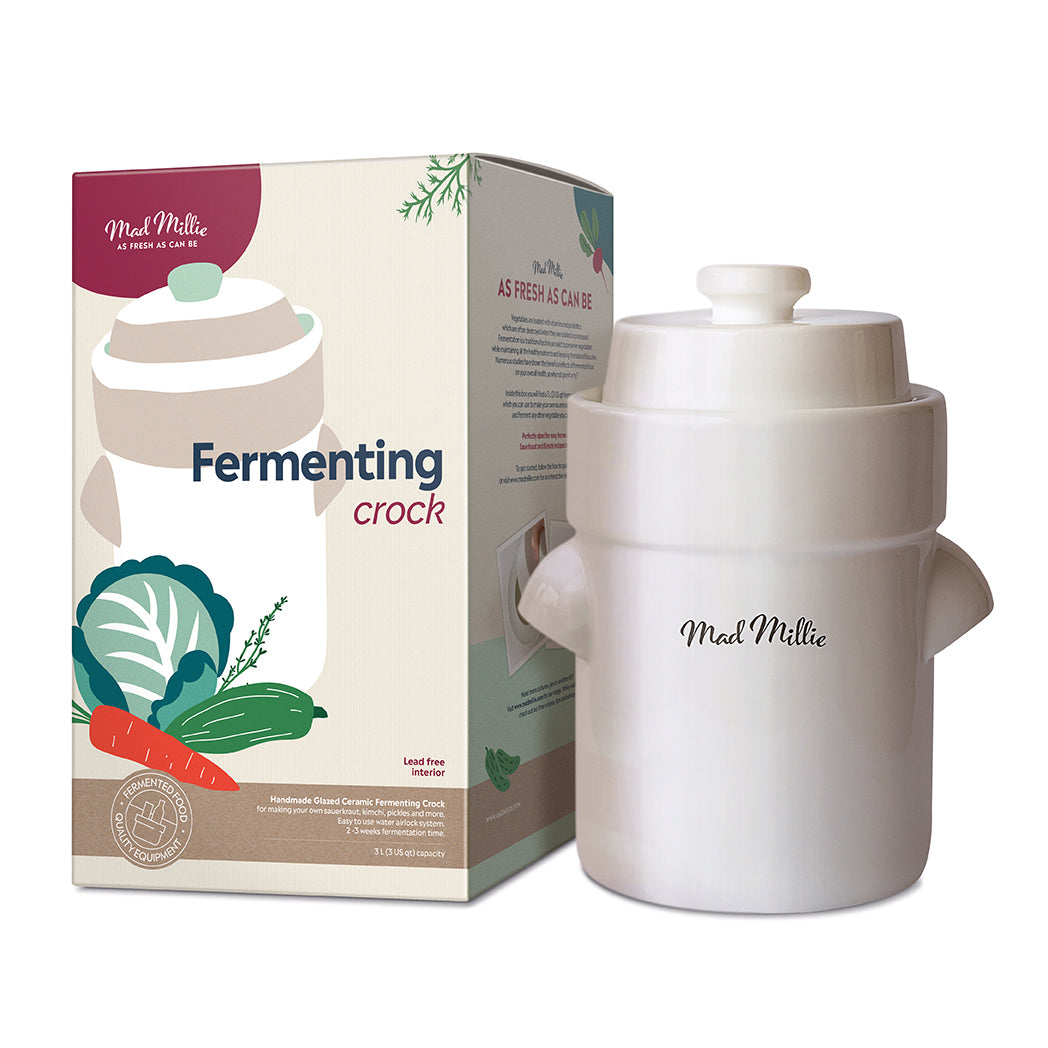Christmas Gifting with Mad Millie
Let us make the gifting season a little more personal and creative this year with our Top Picks. Our Mad Millie Kits make the best gifts, you heard it here first.

Need Gift Ideas?
This year, skip the usual and give something truly thoughtful. Our Mad Millie kits let your friends and family create something special with their own hands. From creamy cheeses and tangy kefir to zesty limoncello and classic fermented vegetables, these kits are perfect for anyone who loves to craft, taste, and explore the joy of homemade. These are our top picks for gifting season.
Type:
Mad Millie 15 Minute Sourdough Kit
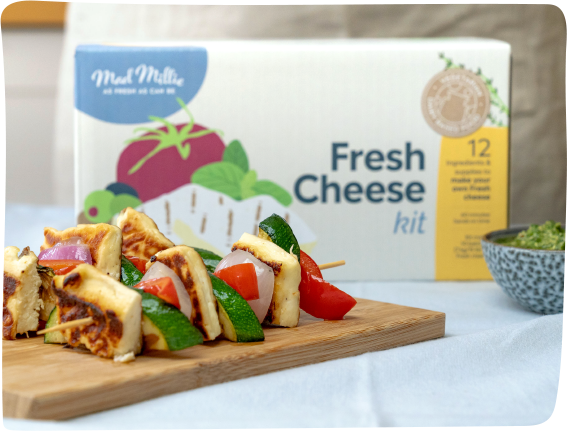
Cheese Kits
With all the specialised ingredients and step by step instructions, Mad Millie kits are the perfect introduction to cheesemaking. Getting creative has never been so easy.

Goat Feta Recipe
The distinctive flavour of goat's feta is a great addition to any meal, whether crumbled on top or incorporated as part of the dish. Goat's milk can be temperamental, results will vary with the seasons due to the milk changing. The fresher the milk, the better the cheese!
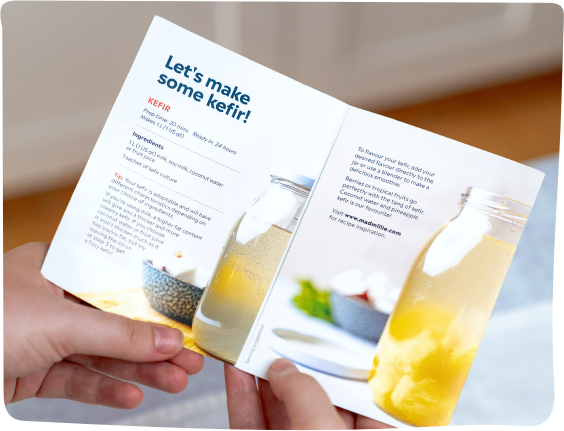
Enjoy the Art of Fermentation
Fermenting is a natural way to create delicious, healthy, and sustainable food at home. From sauerkraut to kombucha, you can craft vibrant flavours full of probiotics and goodness with Mad Millie’s easy-to-use kits and quality ingredients — making it simple to enjoy the satisfaction of creating it yourself.

Considering Sourdough?
We sometimes get questions about the difference between a sourdough starter and a sourdough culture. It can be a bit confusing, especially if you’re just getting into this whole breadmaking business. Is one better than the other? Will they make different types of sourdough? How do I know where to start?
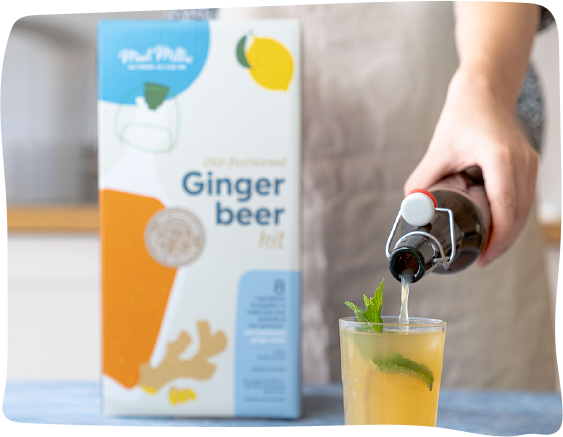
Curious about making drinks?
Brewing or infusing your own beverages from scratch can be incredibly satisfying, especially when sharing the finished product with friends and family. Ginger beer, kombucha or gin anyone?
Type:
Mad Millie Old Fashioned Ginger Beer Kit
Type:
Mad Millie Reusable Brown Glass Flip Top Bottles 750ml x 6
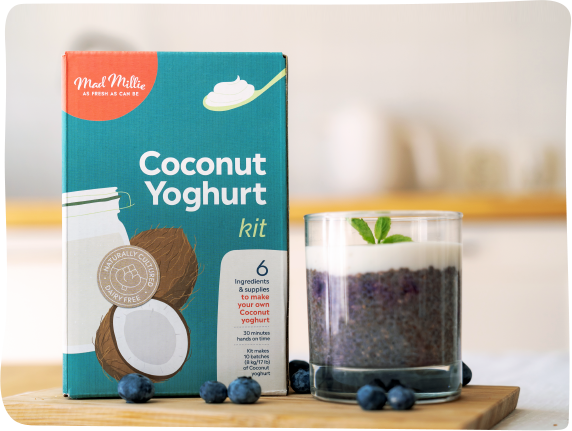
Vegan Kits
At Mad Millie we strive to support more sustainable choices in the best way we know how. The Mad Millie vegan range ensures you don’t miss out on some of the best things in life, namely cheese and chocolate!
Fresh from our blog
5 Reasons Mad Millie Kits Make Great Gifts
If you want a gift that is useful and actually gets opened, here are the top five reasons Mad Millie kits stand out and why you should give one to someone you love this holiday season!
Choose to reuse this Plastic Free July
If there’s ever a time to get started with the zero-waste movement, it’s now! This July, we want to encourage you to be part of a global movement to reduce single-use plastic waste. To help you get started, here are some tips for reducing and reusing single-use plastics this July, and from now on! If there’s ever a time to get started with the zero-waste movement, it’s now! This July, we want to encourage you to be part of a global movement to reduce single-use plastic waste every day – at home, work, school, and even at your local café. If you want to participate but don’t know where to start, we’ll be sharing some tips for reducing and reusing single-use plastics this July, and from now on! Plastic Free July was created in 2011 in an to raise awareness around reducing single-use plastics. The movement has grown from strength to strength and in 2019, there were over 250 million participants. On the Plastic Free July website, you can pledge to participate in many ways: - Choose to observe the challenge for a day, a week, a month or beyond - Avoid single-use packaging or choose to go completely plastic-free - Make changes on a personal level, at work, at school, in your community or anywhere else you are involved. Now, avoiding plastic for an entire month may seem difficult or maybe near impossible, but it’s important to remember that Plastic Free July is not about being perfect, it’s about reducing plastic waste in a way that fits into your lifestyle. With the world still facing the COVID-19 pandemic, it may be difficult to find the substitutions you’re looking for, so don’t be hard on yourself. Remember, the health and safety of you and your loved ones come first and foremost. If the month can help open your eyes to the plastic pollution epidemic, then you can consider it a success. There’s no better time to get involved. But, where do I start? 1. Say no to the “Big Four” Replace single-use plastic bags, water bottles, takeaway coffee cups and straws with reusables. Most of us can simply say no to straws but for the others, think shopping bags made from organic fibres, metal or glass water bottles and a ceramic mug or metal thermos for your daily grind. 2. Start Building Up Your Reusable Collection Take things a step further by reducing more single-use plastics like produce bags. You can easily make your own or buy them from your local supermarket. Better still, if you only need a couple of onions or lemons, try skipping the bag entirely. Another idea is to stash a set of metal utensils - a knife, fork and spoon - in your bag and use a reusable container for lunches, storage, takeaways, and shopping. You can also start hoarding glass jars; use these for everything; storing and shopping for bulk foods and making food (like fermented sauerkraut). Lastly, invest in some beeswax wraps to avoid that sticky plastic film we’ve become all too familiar with. 3. Eat the Real Stuff There are many ways to cut out processed foods that are most commonly purchased in plastic packaging. We’d recommend sticking to natural, simple foods. For recipe inspiration, take a look at our recipes for homemade versions of your favourite foods. We bet they'll even taste better than their packaged, processed counterparts. Or, get your hands on one of our kits and start fermenting yoghurt, making cheese, brewing kombucha and more. We even have something for our vegan friends too! 4. Ask, Ask and Ask Some More Not sure if your local takeaway fills reusable containers? Just ask! Most places won’t know what you’re talking about, so hand over your container and ask the server to put food in it. Maybe even throw in why you’re doing this to raise awareness. 5. Do It With a Friend By taking the challenge with a friend, partner or colleague, you'll be able to enjoy the support of other like-minded individuals – and have fun while doing it. There is power in numbers! 6. Google It If you can’t think of an alternative to your regular single-use plastic item, ask Google for a ‘life hack’. There is tons of information out there; it’s up to us to find it! By making a small change, you can be part of the solution to plastic pollution. Help play your part towards cleaner streets, oceans, and beautiful communities. Best of all, this Plastic Free July will help you find alternatives that can become new habits forever. How will you be taking part this July?
Apple Ginger Beer for Father's Day
Father’s Day is just around the corner if you call the US or UK home. It’s one of those days where you don’t want to spend a fortune, but a little bit of acknowledgment for everything your Dad or father figure has done is always appreciated. Gifting something you’ve made yourself is the best way to win him over, you’ll be the favourite in no time. We’ve come up with a new Apple Ginger Beer recipe that we highly recommend you try out. It’s the perfect refreshing beverage, the strong, spicy notes of ginger with a slightly sweet, more complex apple base. If you’re like us and prefer it to be heavier on the ginger, don’t be scared to throw in a few more chunks of the good stuff. If you want to try some different flavours change the apple juice for an alternative; pear, cranberry or pineapple. Just make sure the sugar content is the same as the apple (around 10g/100mL on the nutrition panel). If it is more or less then adjust the added sugar and water levels accordingly. Too much sugar may cause speedy fermentation resulting in more alcohol and exploding bottles. If you’re based in NZ or Australia now is a great time to start practising your recipes so they’re perfect in time for September. Alcoholic Apple Ginger Beer Ingredients 400 g (14.1 oz) brown sugar 3.25 L (3.4 US qt) water at 35oC 20 g (0.7 oz) dried ginger or 2/3 cup (1.3 oz) of fresh ginger juice ½ cup (125 mL) lemon juice 1 packet Mad Millie Ginger Beer Yeast 1 L (1 US qt) Apple juice White sugar for carbonation Method Dissolve the sugar in 1 L (1 US qt) of water, mix in the ginger and lemon juice. Add to the fermenting jar. Add the apple juice and remaining water to the fermenting jar. Add the yeast and carefully swirl to mix. Half fill the airlock with water and fit to the top. Ferment for 1 week at room temperature (20oC/68oF). After 1 week sanitise 6 x 750 mL glass bottles, a jug and a funnel with boiling water. Use the 0.75 scoop on the 3-way sugar measurer to add 1 scoop of white sugar to each bottle. Pour the ginger beer into bottles. Seal and ferment for 2 weeks at room temperature (20oC/68oF) then enjoy!




